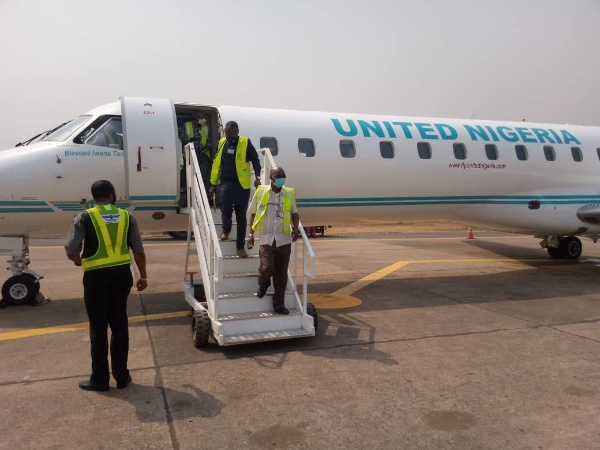Few hours after one of the aircraft of United Nigeria Airlines (UNA), diverted to Asaba International Airport on Sunday, rather than the Nnamdi Azikiwe International Airport (NAIA), Abuja, the Nigeria Civil Aviation Authority (NCAA), has suspended all the wet-leased aircraft under the airline.
A source close to NCAA, confided in Nairametrcs on Monday that the apex civil aviation regulatory body took the decision on Monday via a letter communicated to the Chief Operating Officer (COO) of the airline.
Immediate suspension
According to the source, all the wet-leased aircraft in the operations of the airline would remain suspended pending the outcome of an investigation on the Sunday incident, involving one of the wet-leased aircraft in the fleet of the airline.
It was gathered that immediately the incident gained traction on social media on Sunday, the Director-General of Civil Aviation (DGCA), Capt. Musa Nuhu called an emergency meeting of the agency, where it was resolved that the excuse given by the airline was not tenable to the authority.
Besides, our correspondent further gathered that the report obtained from the Air Traffic Controllers (ATCs) of the Nigerian Airspace Management Agency (NAMA), contravened the claim of the airline on poor weather situation in Abuja as at the time of the diversion.
No fewer than two wet-leased Airbus A320-200 aircraft are in the fleet of United Nigeria Airlines.
Wet-leased arrangement
A wet-leased is a leasing arrangement whereby one airline (the lessor) provides an aircraft, complete crew, maintenance, and insurance (ACMI) to another airline or other type of business acting as a broker of air travel (the lessee), which pays by hours operated.
Also, at times, the cabin crew may be indigenous people.
The source said: “NCAA has suspended all the wet lease aircraft in the operations of United Nigeria Airlines. The excuse they provided to us that the diversion to Asaba was due to poor weather in Abuja was not acceptable to us. So, we have to take the big step by suspending all the aircraft that are wet leased in their fleet.
“The aircraft will remain suspended until after investigation. We can’t allow this to happen. The fact is that their crews are foreigners and they are not familiar with Nigeria, which the airline ought to have done. So, we are suspending them until after the investigation.”
Diversion to Asaba
Recalled that United Nigeria Airlines flight NUA 0504, operating from the Murtala Muhammed Airport two (MMA2) in Lagos enroute Abuja on Sunday, diverted to the Asaba International Airport.
The airline in a statement by Achilleus-Chud Uchegbu, Head, Corporate Communications, had attributed the diversion to poor destination weather.
But, aviation experts, nullified this claim, saying that weather reports are released to pilots or airlines every 30 minutes.
The airline maintained that at all material time, the pilot of the aircraft was aware of the temporary diversion and was properly briefed.
However, a wrong announcement was made by the cabin crew upon landing safely in Asaba, creating confusion among the passengers, the airline purported.
The statement added: “Meanwhile, the aircraft has landed safely in Abuja following improvement on destination weather.
- “United Nigeria Airlines remains committed to ensuring the safety of its passengers at all times.”
Delivery of wet leased A320 aircraft
United Nigeria Airlines had last month taken a delivery of a wet lease A320-200 from Bulgaria’s Fly2Sky (F6, Sofia).
The air aircraft is expected to be in the fleet of the airline till March 31, 2024, to boost domestic capacity during the IATA winter season.
Under the contract, LZ-FSA (msn 4247) will be based in Nigeria and operate domestic routes, Fly2Sky announced in a statement.
“We are excited to bring our Airbus A320 LZ-FSA to the heart of Nigeria and provide winter operations support for United Nigeria Airlines. This collaboration is not only an expansion of our business but is also about strengthening ties with our partners in the African continent,” commented Fly2Sky’s chief commercial officer, Aleksandrs Gusevs.
